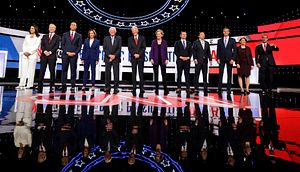Democrats running for the 2020 U.S. presidential nomination implicitly accept – or at least have not rejected – the premise that the United States’ fate is linked to that of the broader Indo-Pacific in some manner. None give any indication that they seek to revolutionize or entirely overturn the U.S. approach to Asia. Yet the candidates hold partly contrasting philosophies about foreign policy and America’s role in the world, and have said little about how they might secure U.S. interests in the region.
The foreign policy differences among the candidates, as well as their areas of consensus, matter because while Asia is unlikely to weigh heavily on the outcome of the 2020 election (barring a crisis or war), the inverse is not true. The election is likely to have significant repercussions for Asian security. The United States’ influence across the region, its myriad commitments, and ample military presence mean that dramatic regional shifts could follow from even modest changes in U.S. policy.
But what changes are conceivable, and why? That requires unpacking the diversity of philosophies about foreign policy that exist among America’s self-described political progressives.
Progressive Schools of Foreign Policy Thought
Liberal internationalism has dominated the foreign policy of the Democratic Party for more than a generation. It represents the pursuit of liberal values abroad – democracy promotion, human rights, free trade, and the legitimacy of international institutions – but it does so through the effective hegemonic leadership of the United States. Liberal internationalists favor multilateralism and economic interdependence, but center both on a United States whose prominence requires not just a forward military presence in Asia, but military superiority over all potential adversaries and the sustainment of the United States’ system of bilateral alliances. In this view, a stable rules-based international order exists because the strongest power in the international system participates in international institutions and allows itself to be restrained by international norms and commitments.
But for the first time since the end of the Cold War, default liberal internationalism faces intellectually coherent challenges from the left. Progressive internationalism, best embodied in the foreign policy platforms of Senators Bernie Sanders and Elizabeth Warren, would reform U.S. foreign policy to better align it with democratic values. This school of progressive foreign policy thought seeks to elevate the strategic importance of some “liberal” elements of liberal internationalism – specifically democracy promotion and human rights protections – but without perpetual military superiority and with deep skepticism about the merits of military interventions abroad. It rejects the realist imperative for alliances of convenience with autocratic nations, and seeks above all to reduce global inequality and transnational corruption because they are key underlying causes of so much insecurity in the world.

































